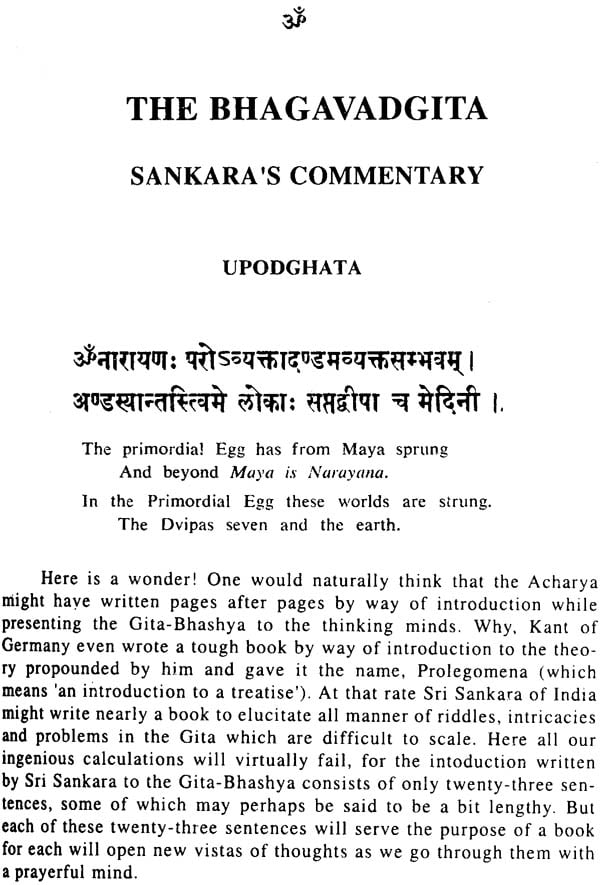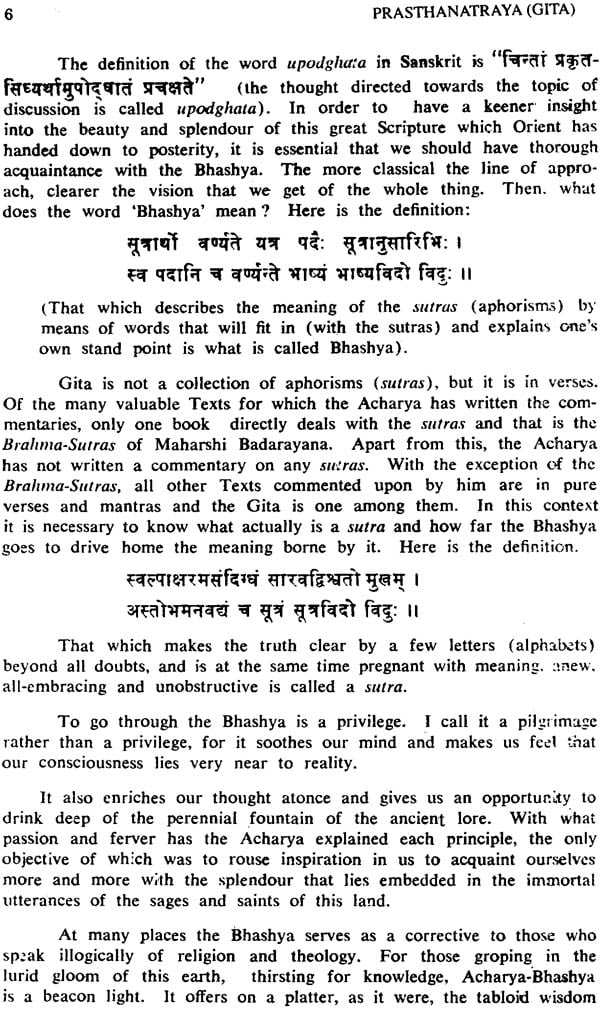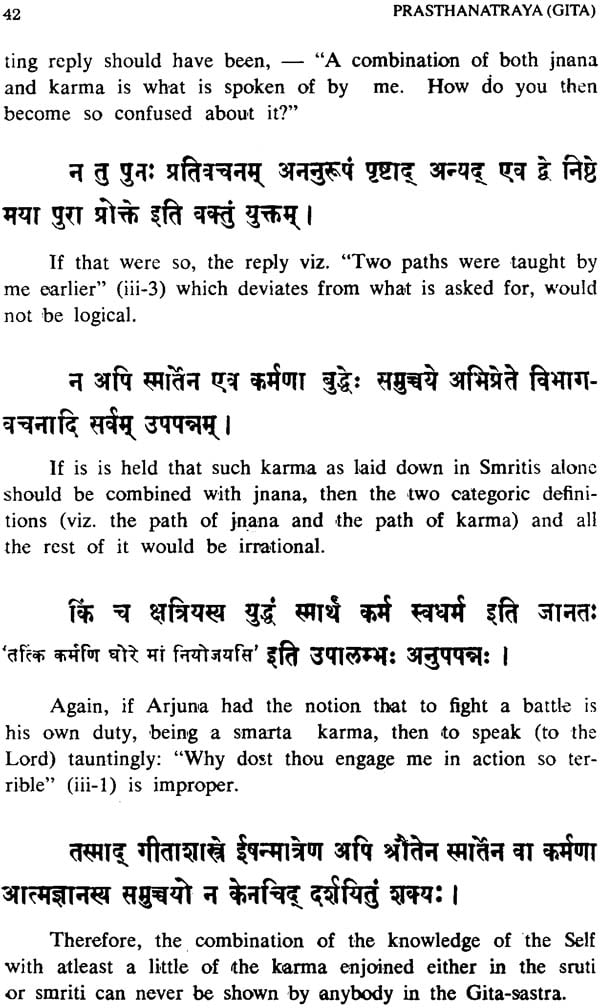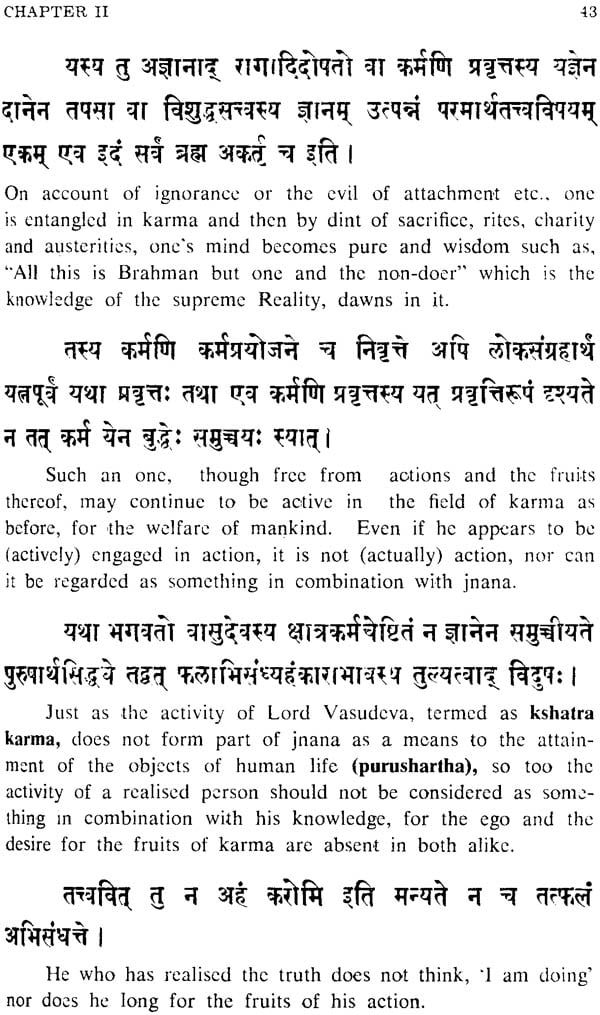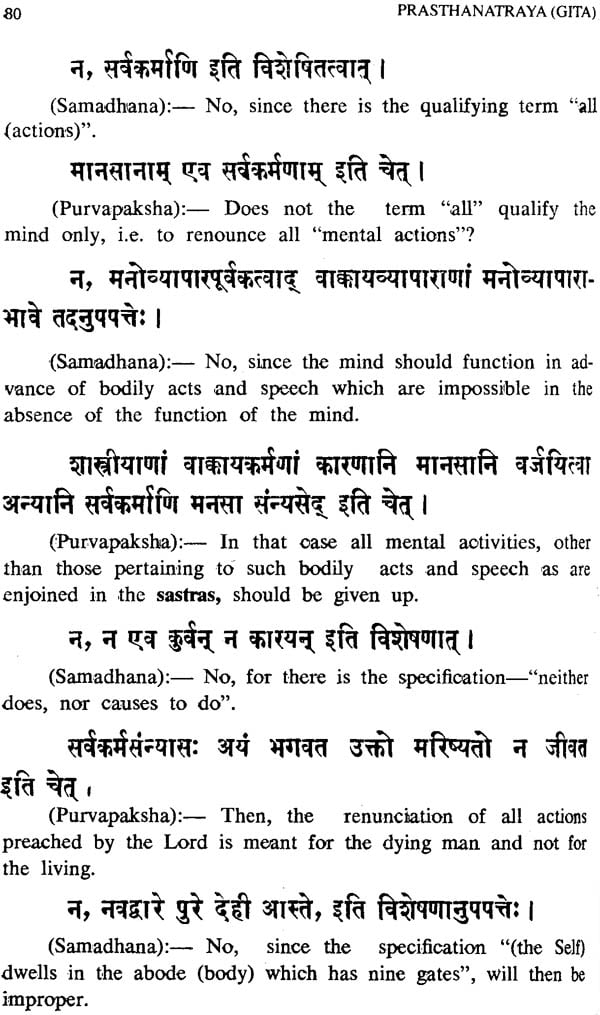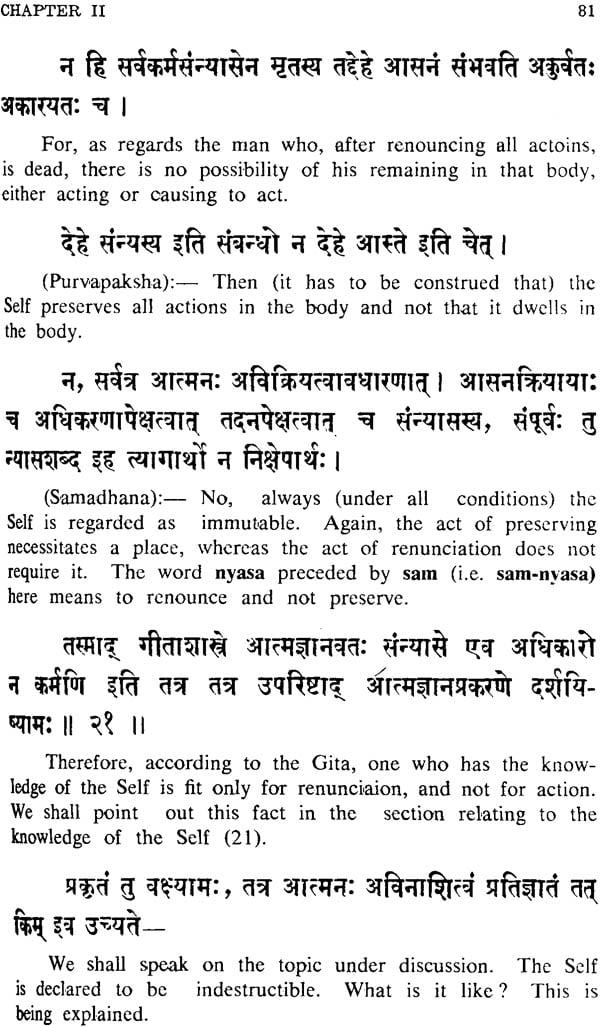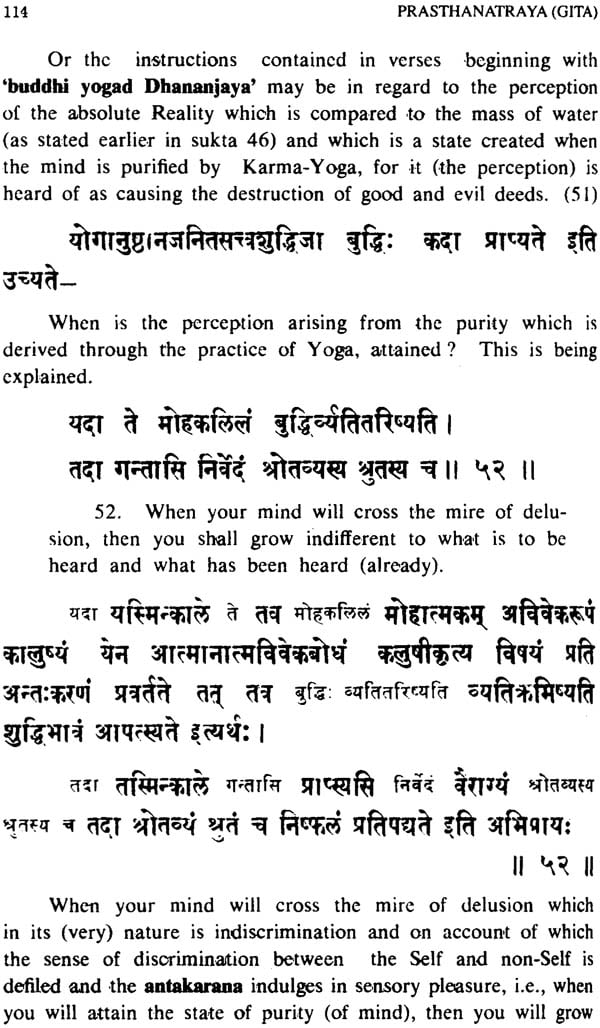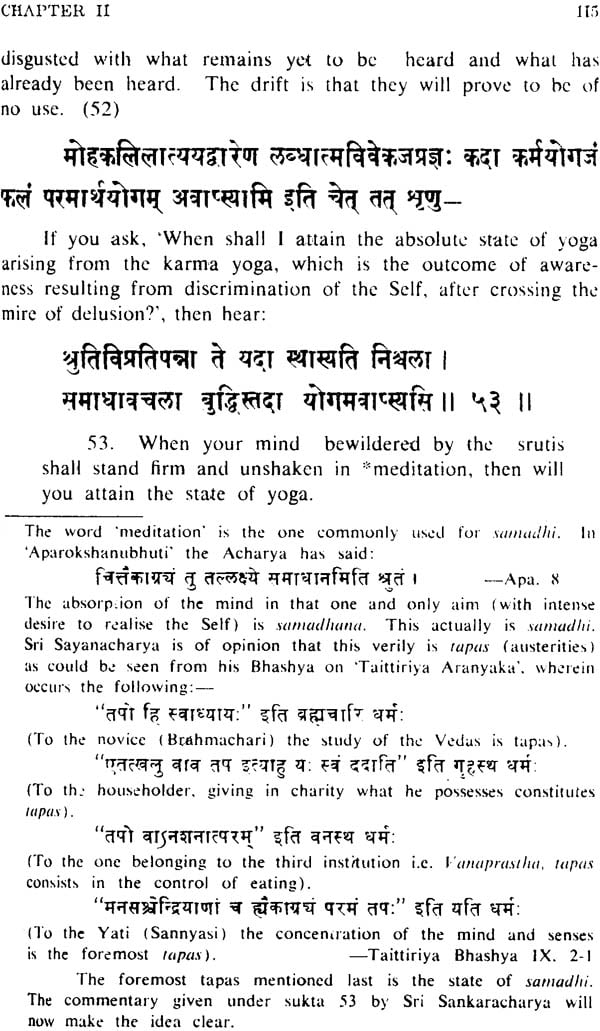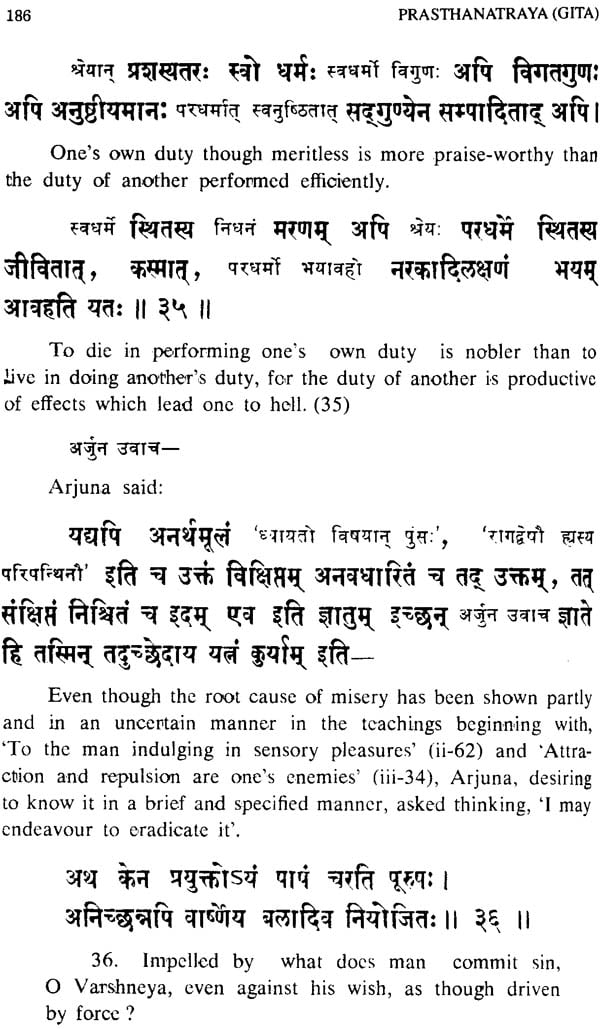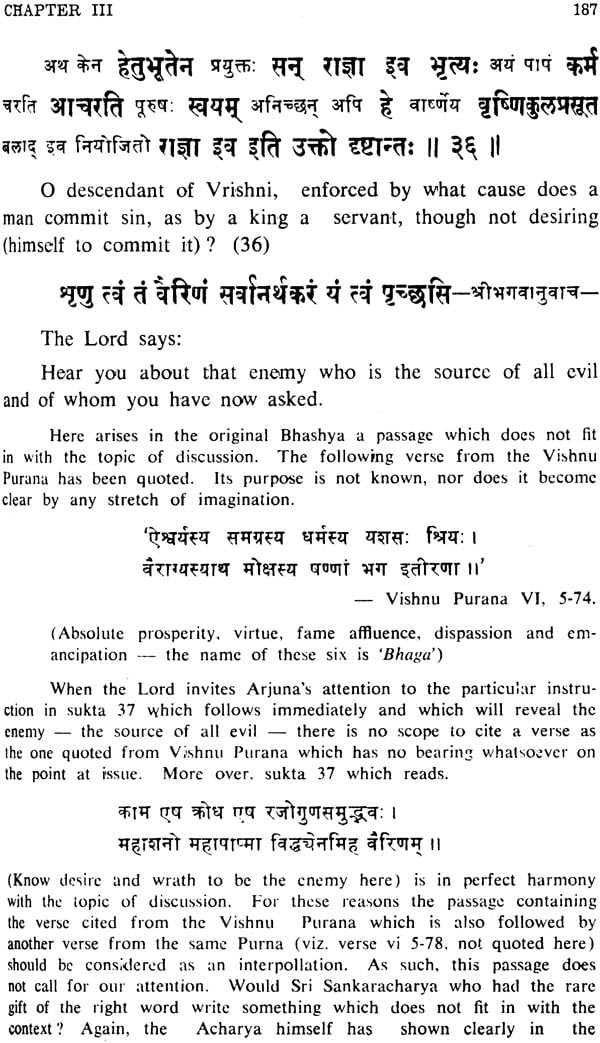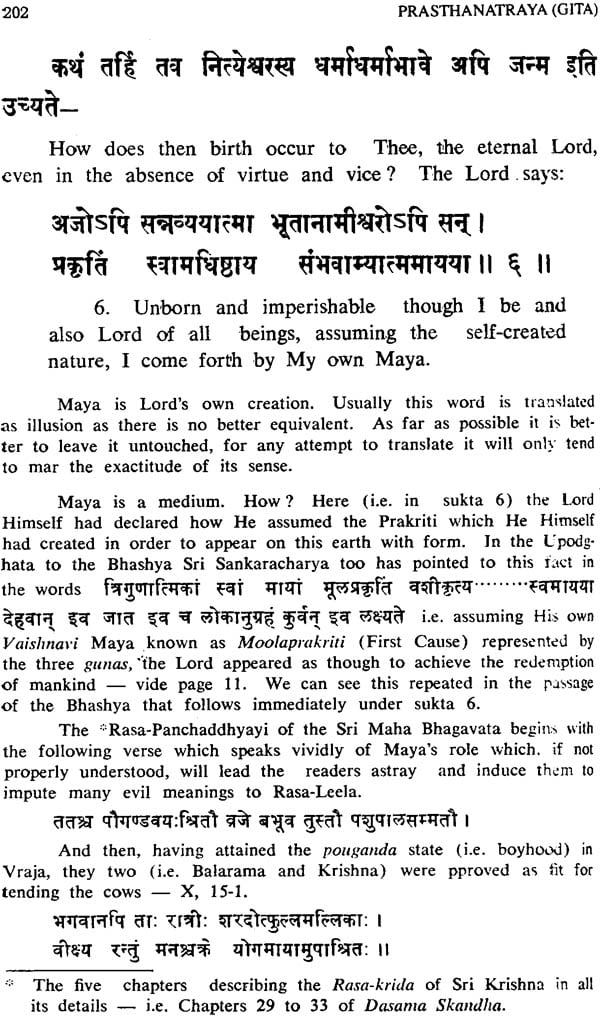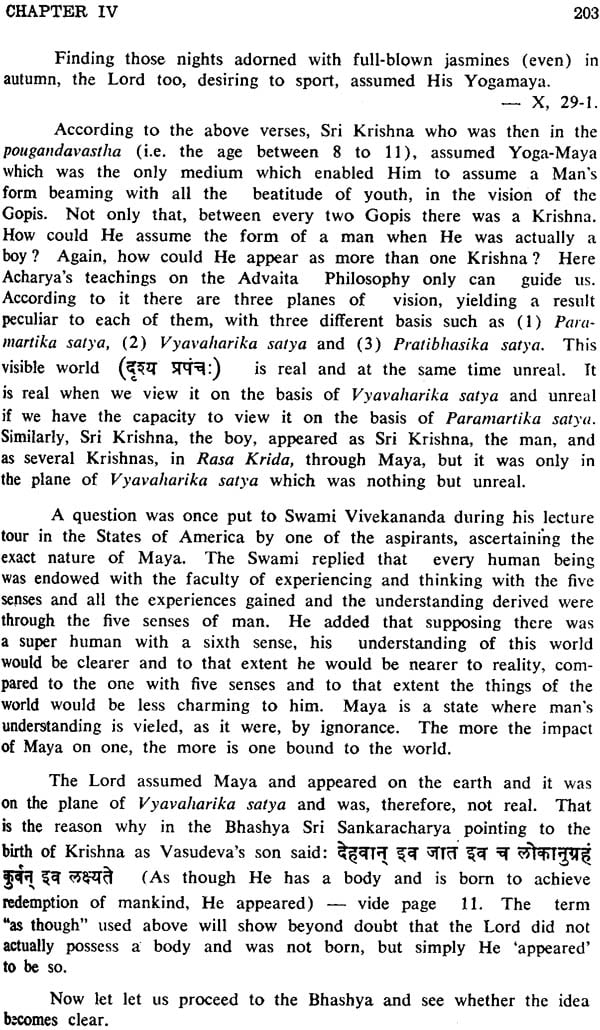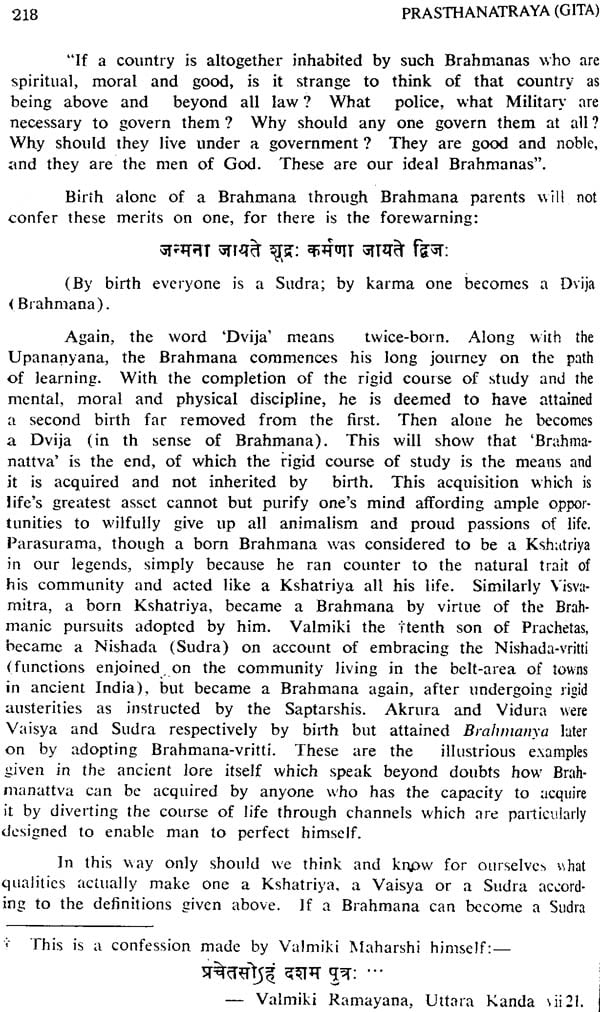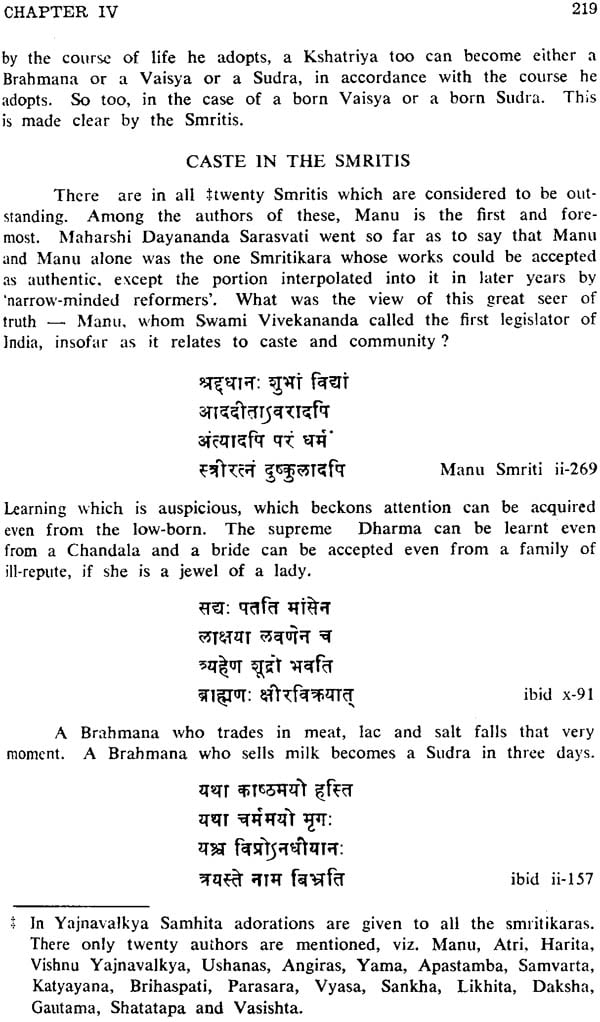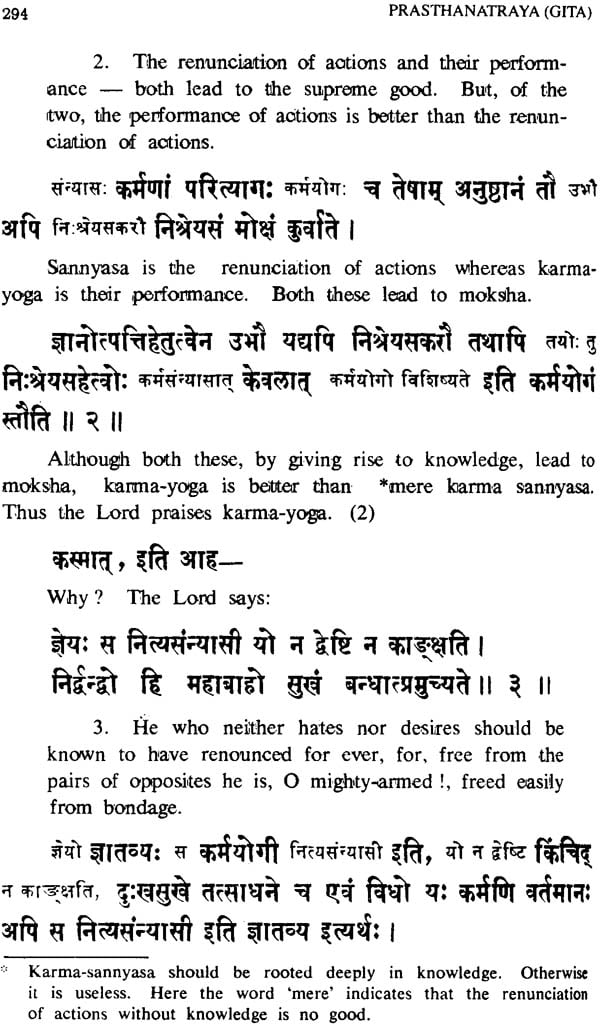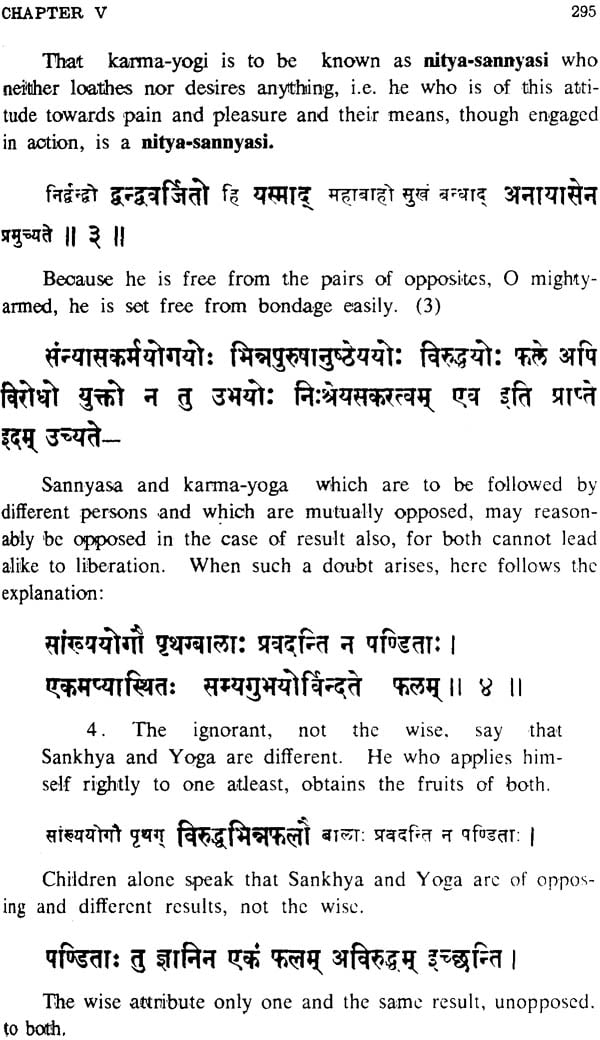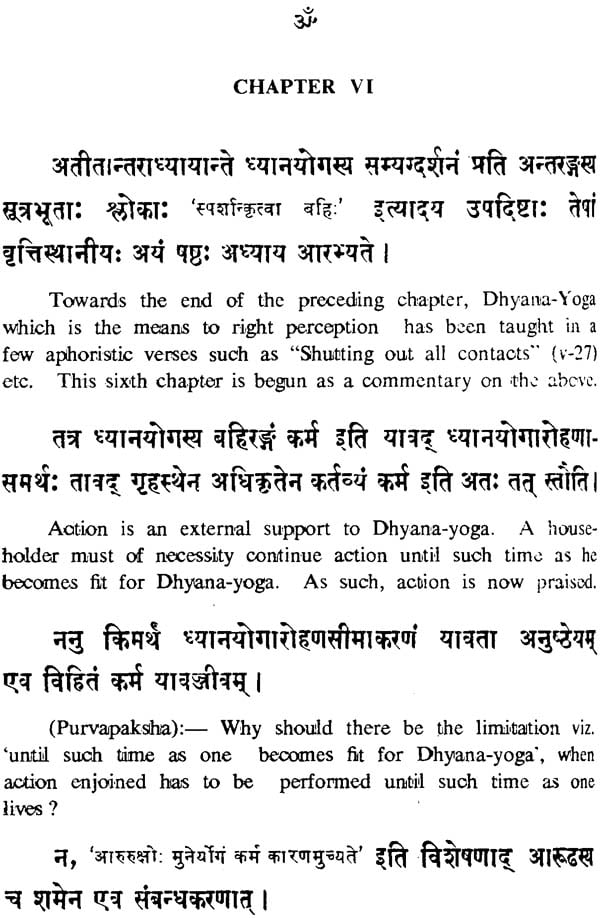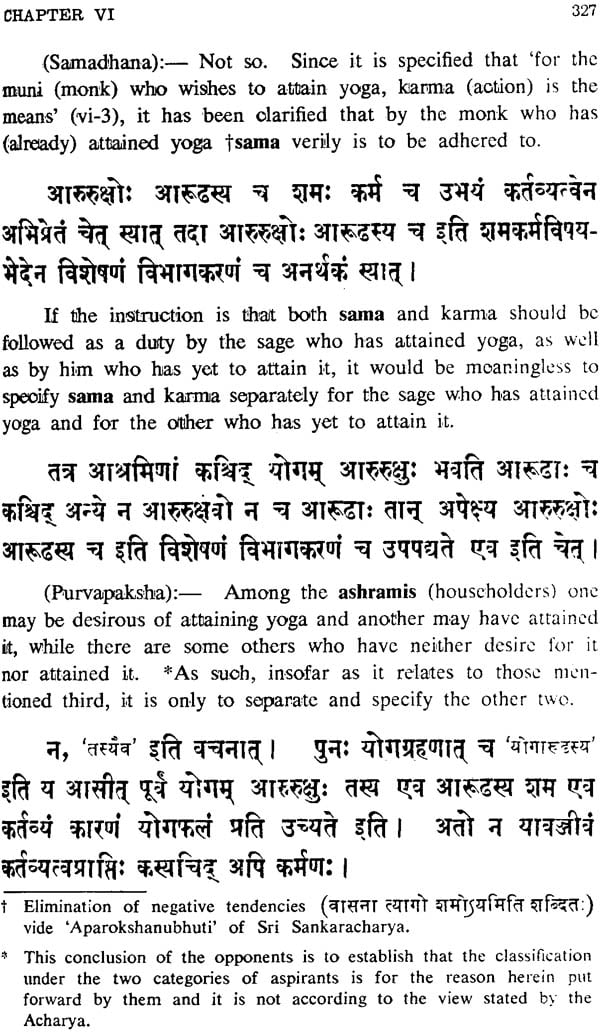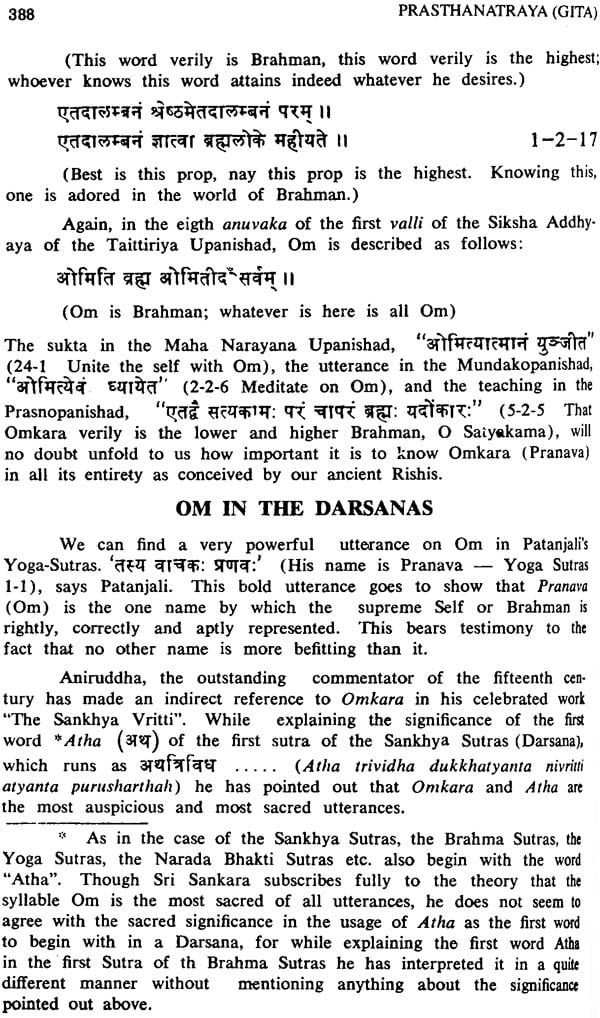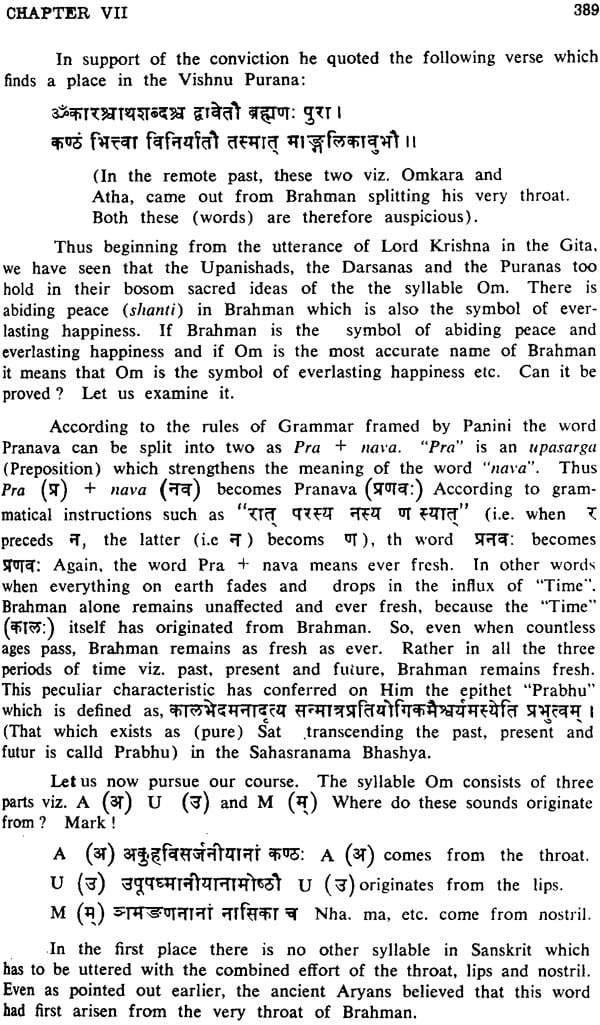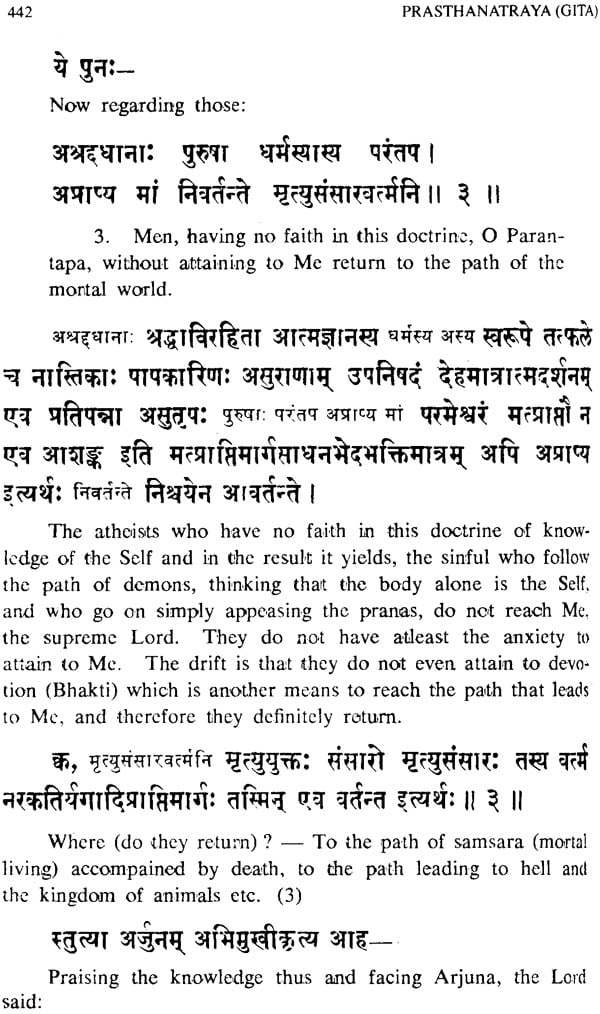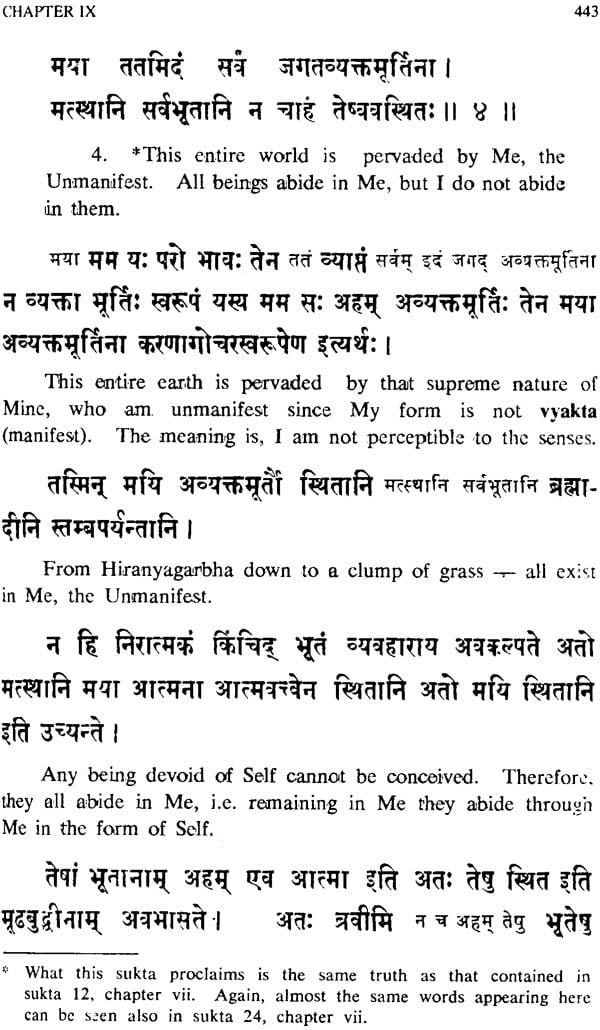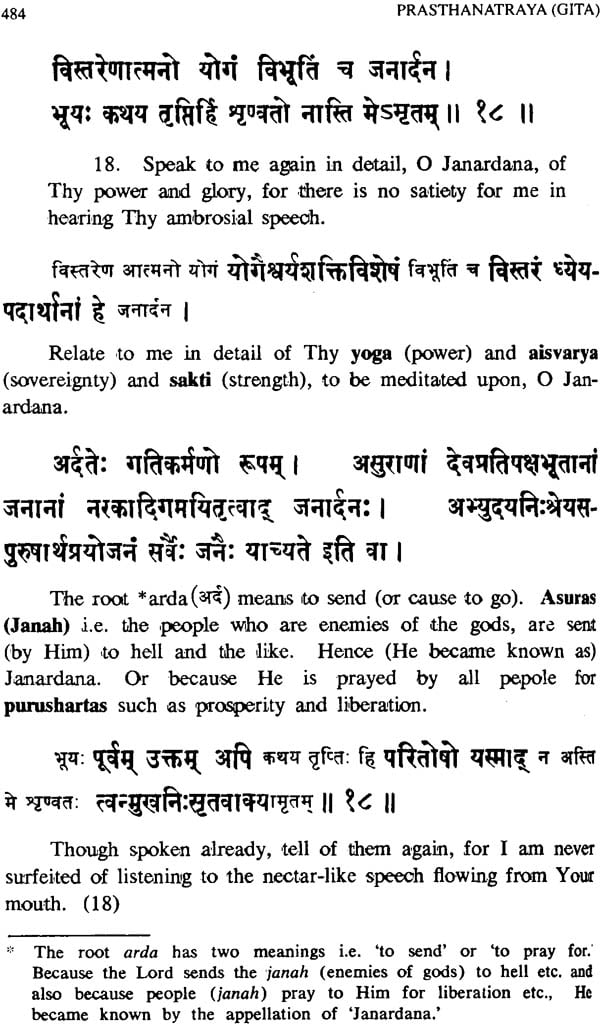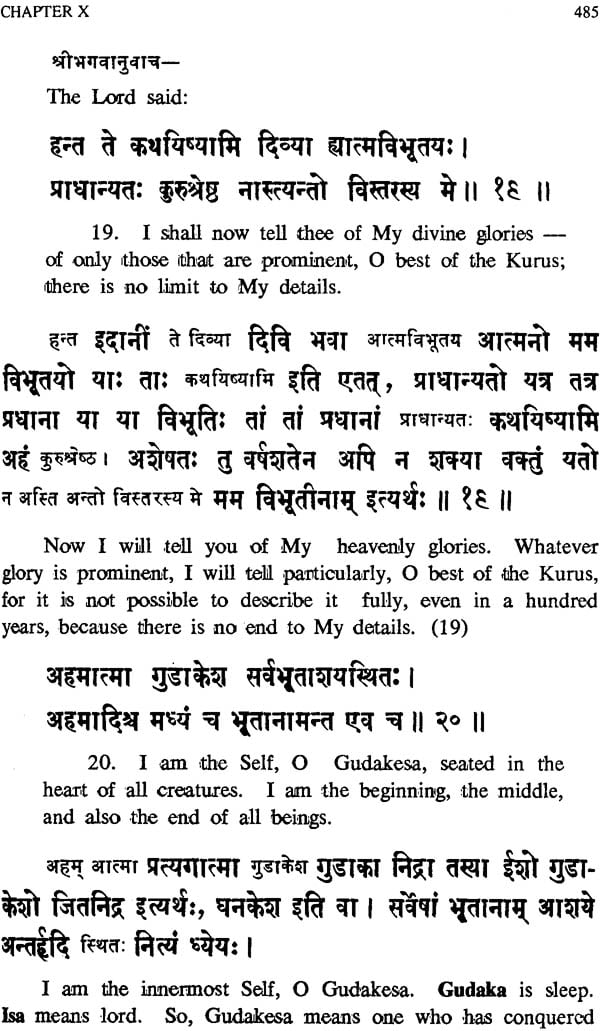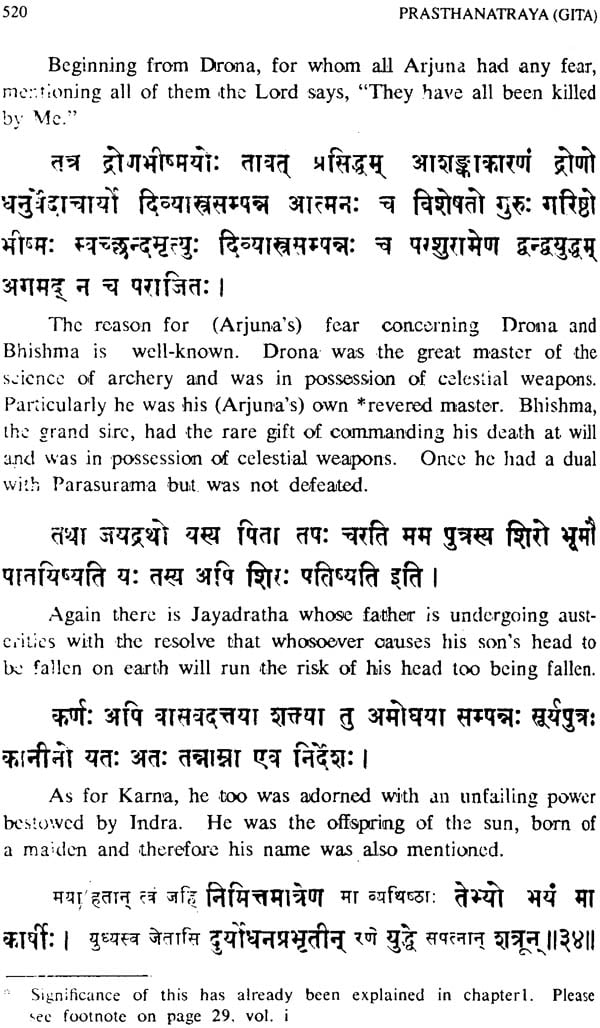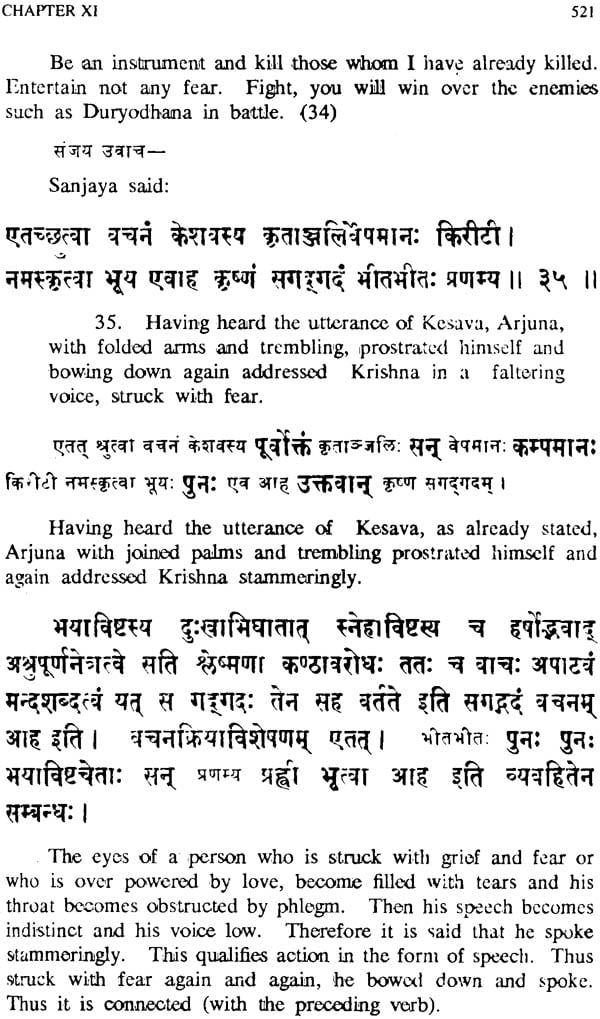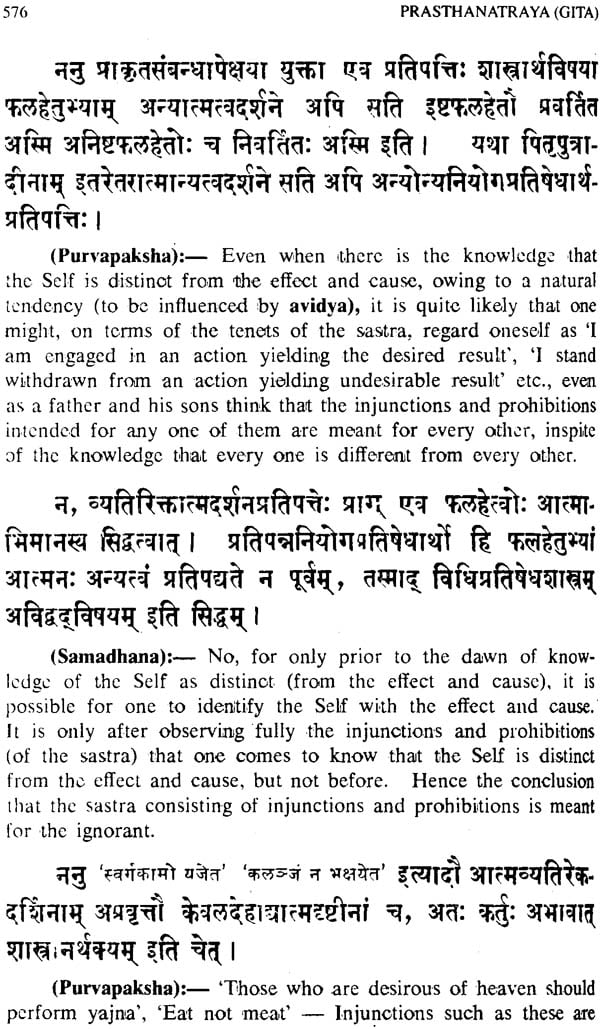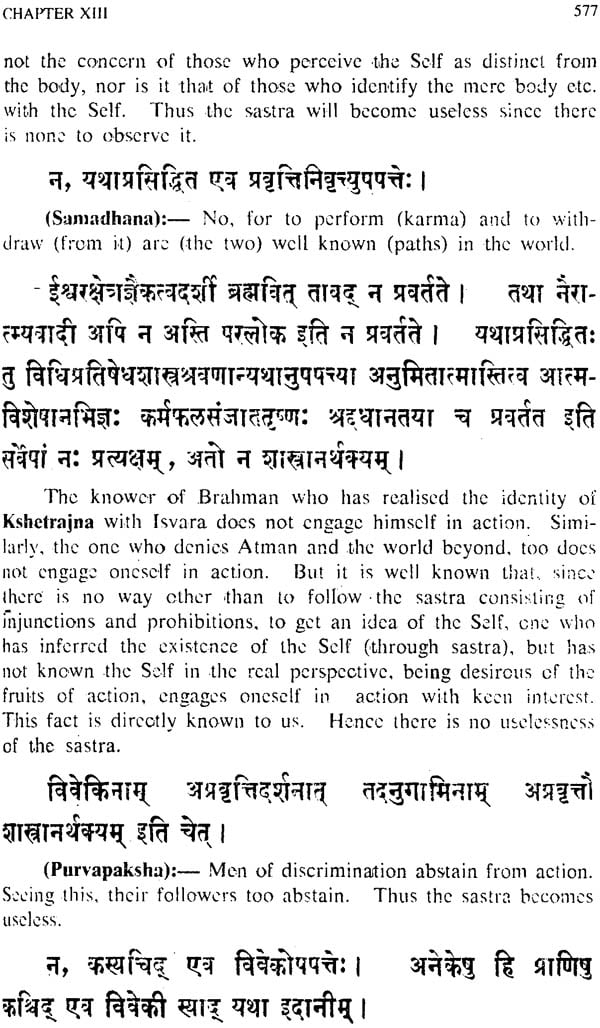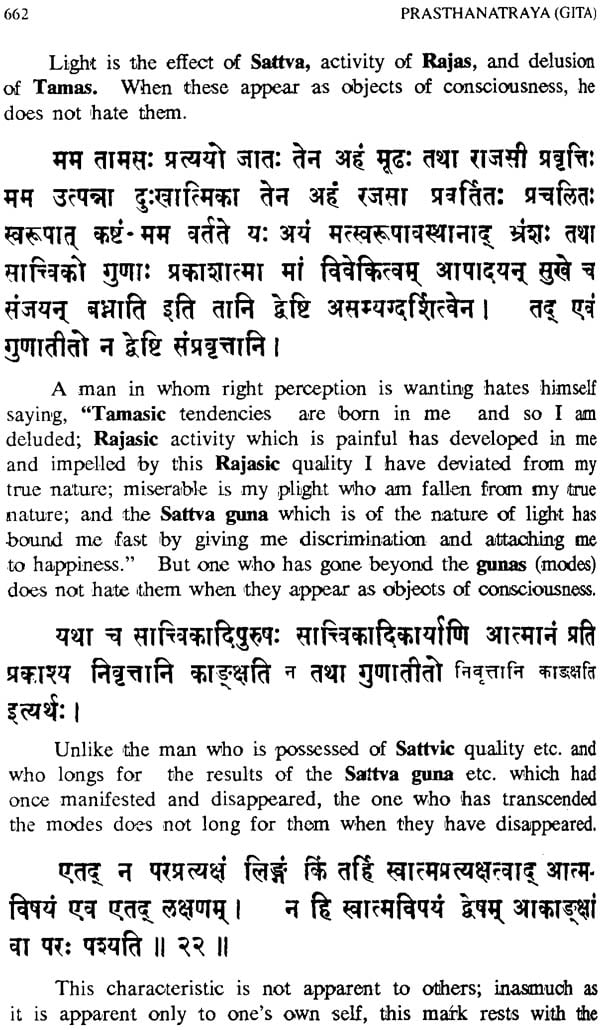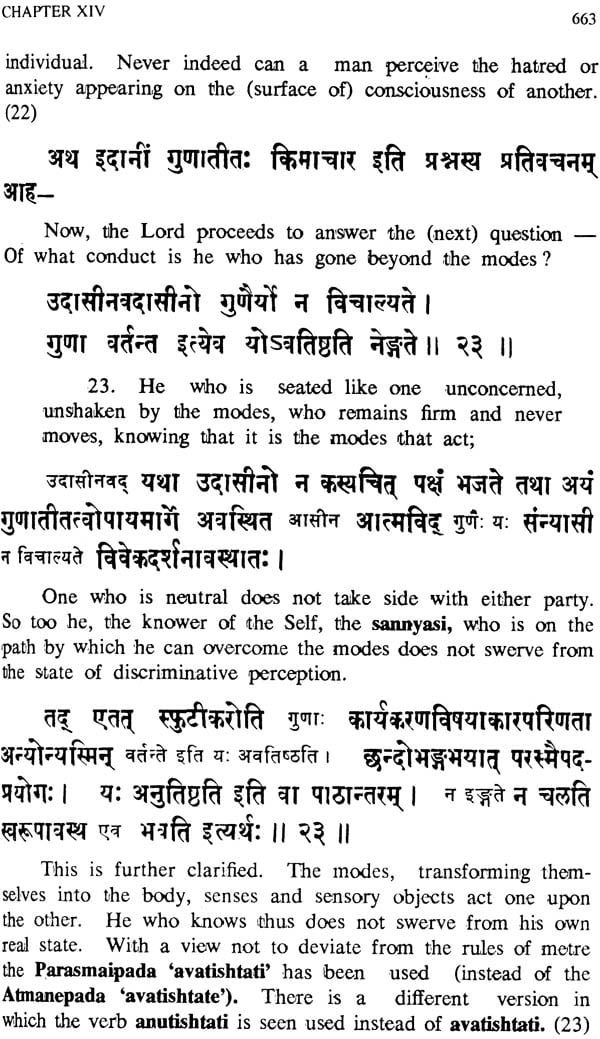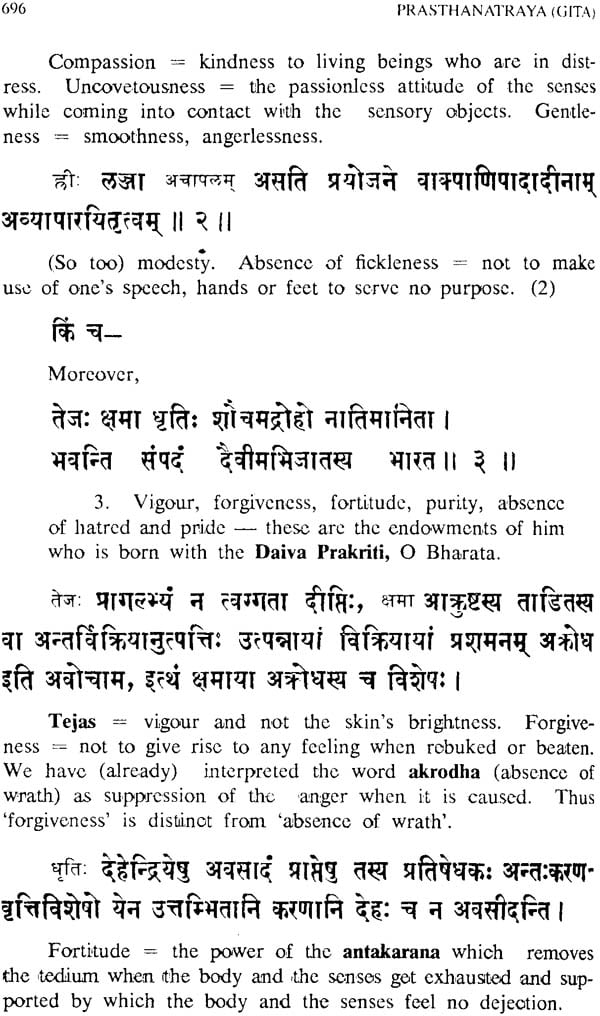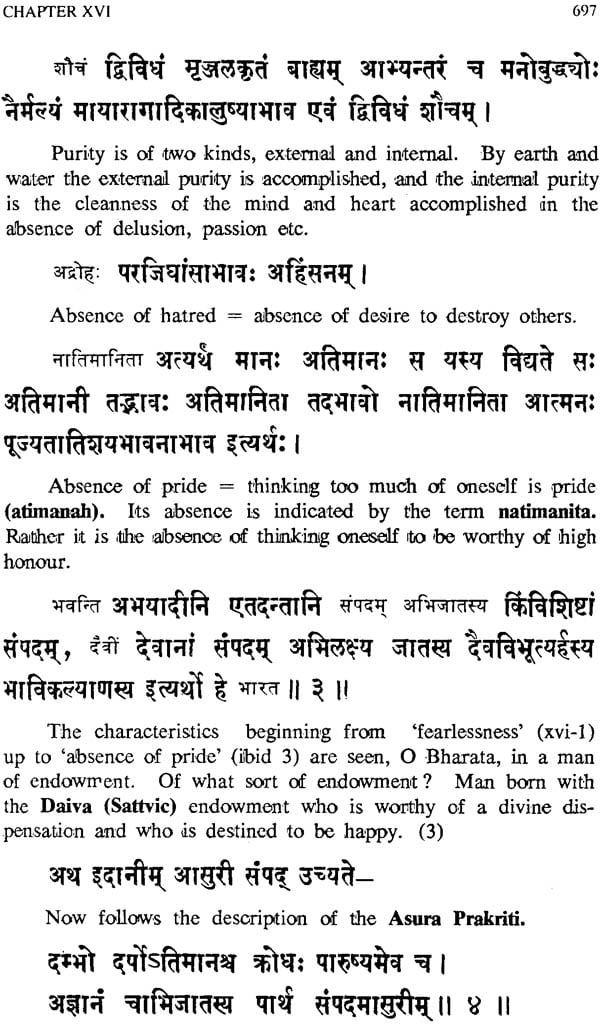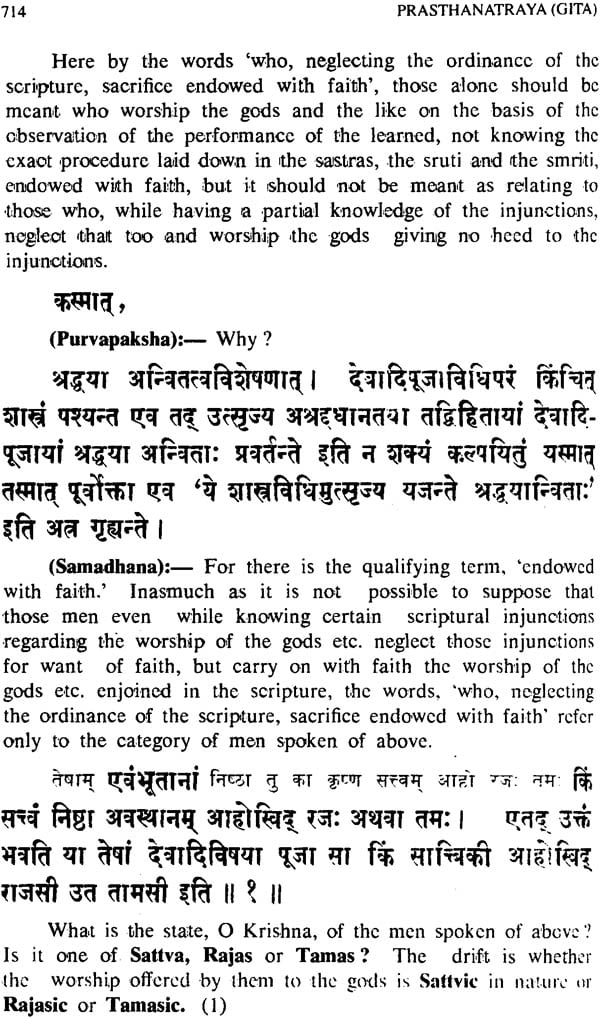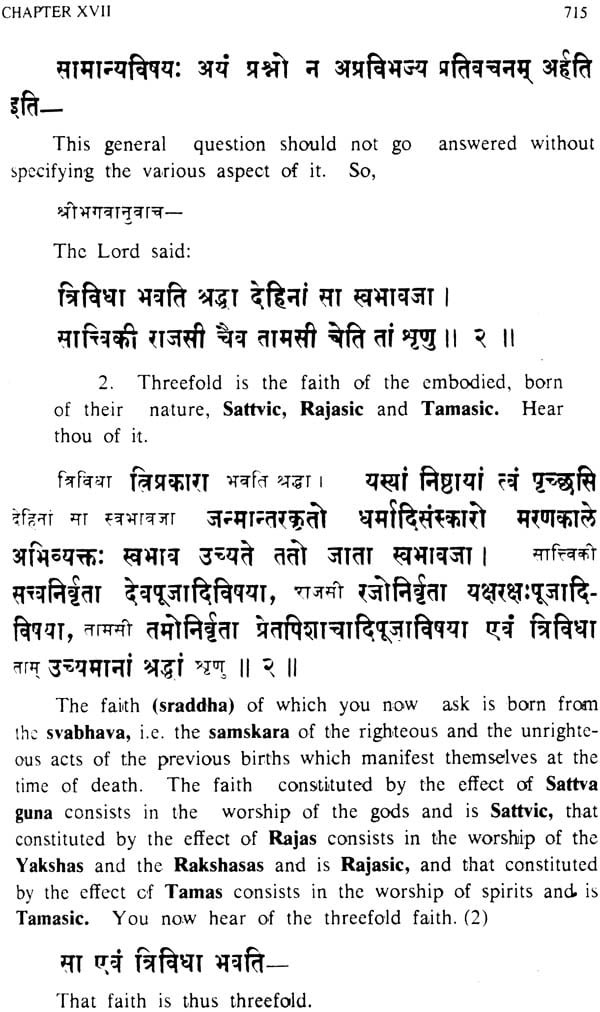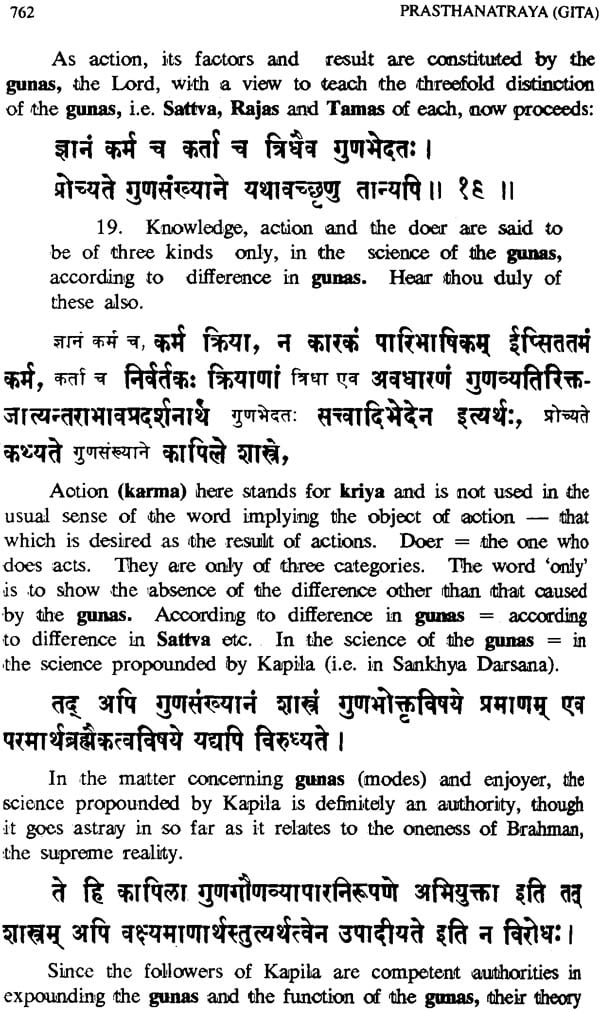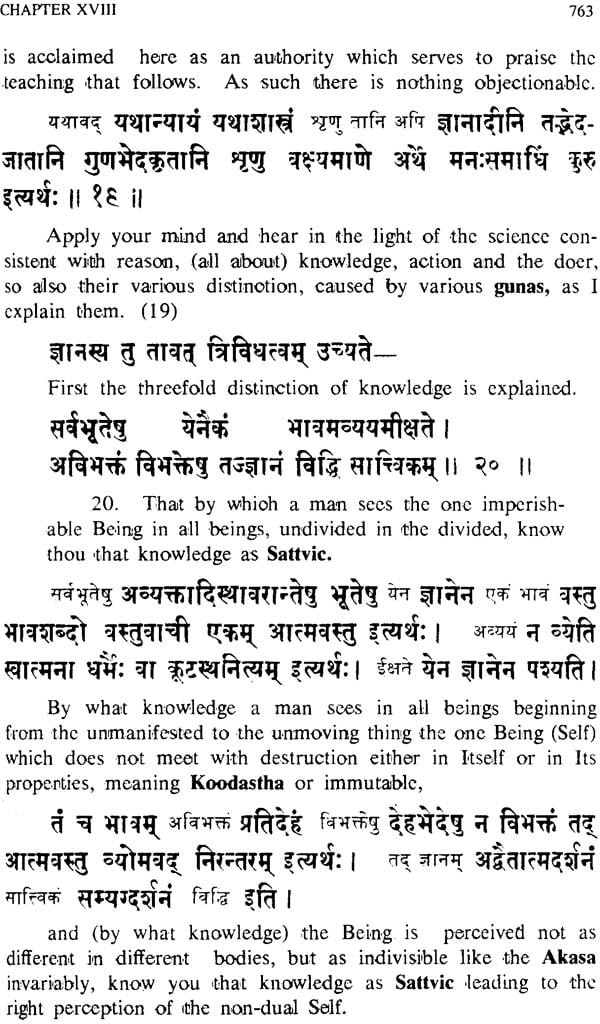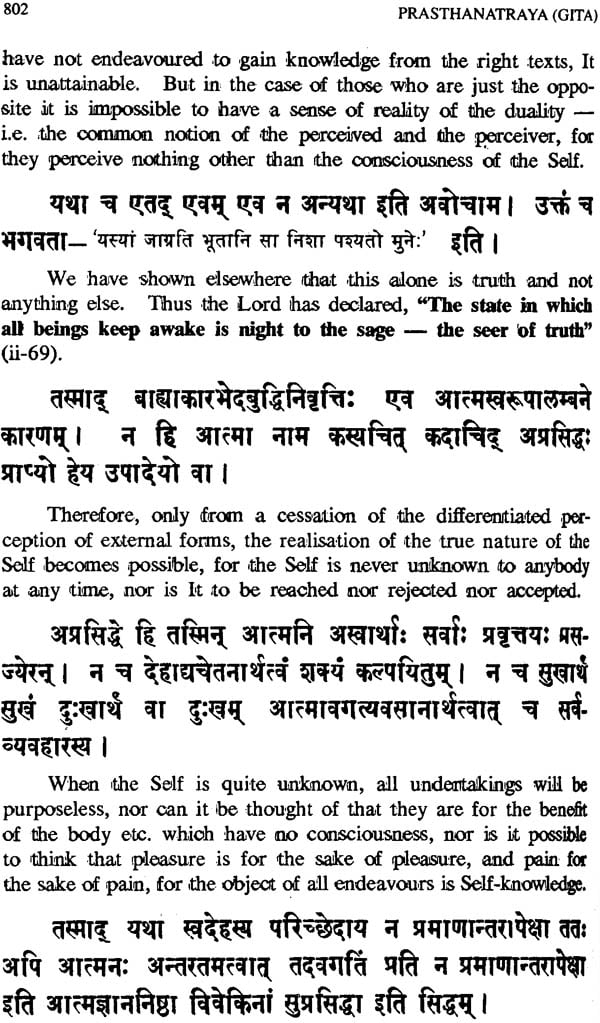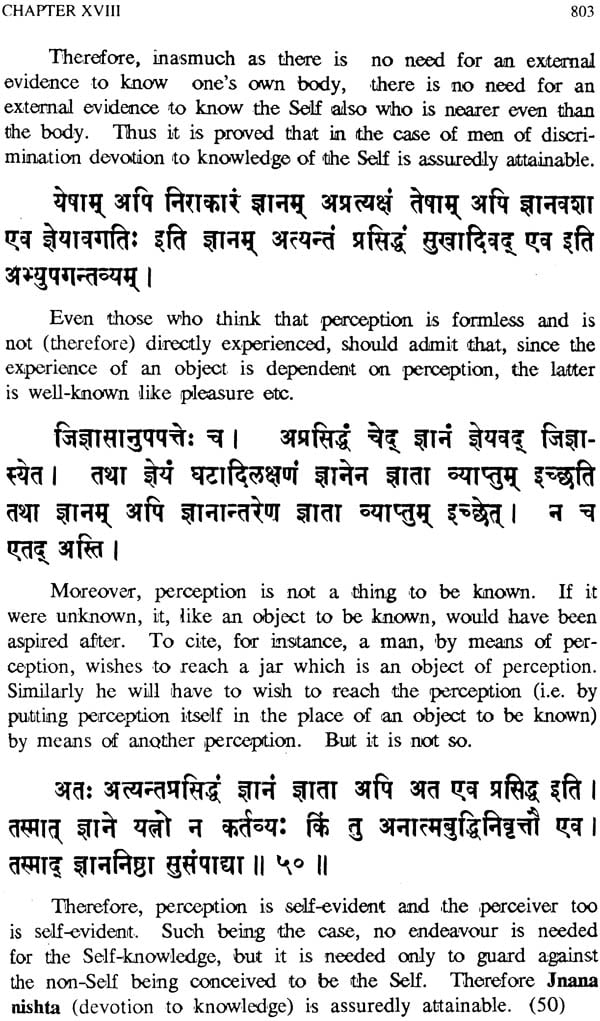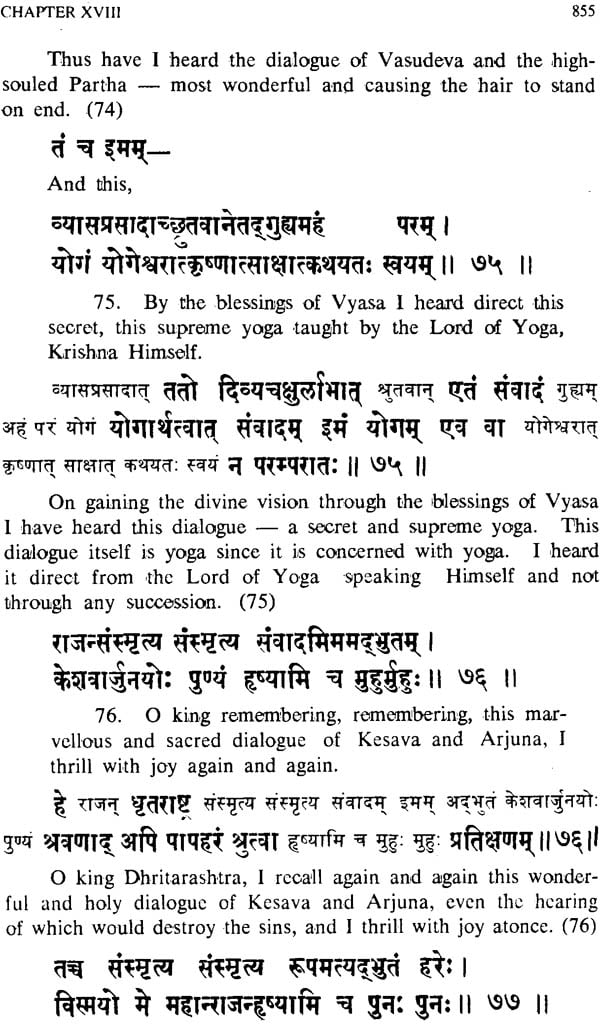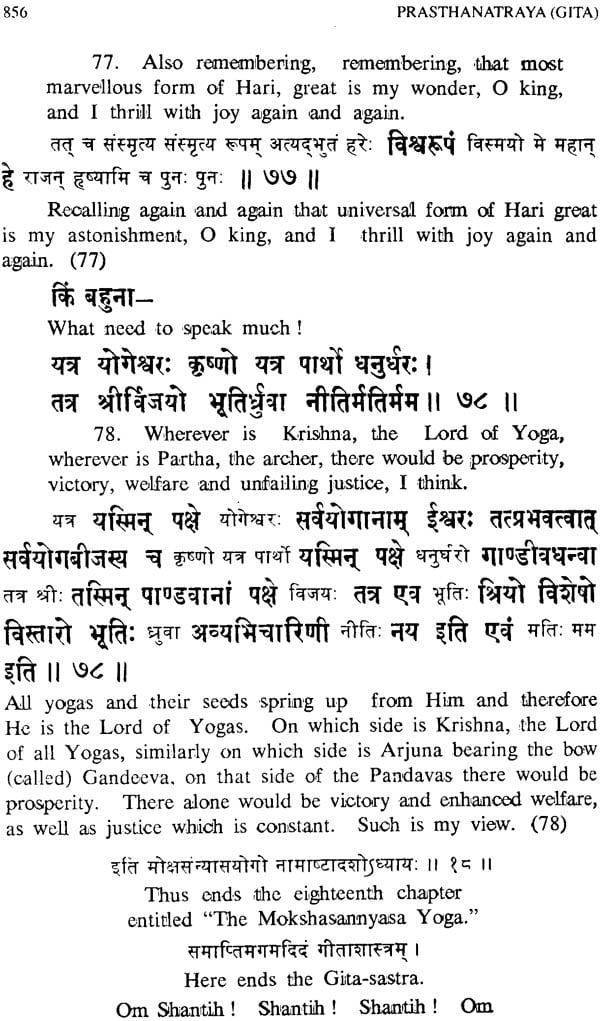
Prasthanatraya (The Bhagavad Gita) The Only Edition with Shankaracharya's Commentary in Sanskrit with English Translation
Book Specification
| Item Code: | IHJ092 |
| Author: | Vidyavachaspati V. Panoli |
| Publisher: | MATHRUBHUMI PRINTING & PUBLISHING CO LTD |
| Language: | In the Original Sanskrit with English Translation) |
| Edition: | 2019 |
| ISBN: | 9788182679474 |
| Pages: | 878 |
| Cover: | Hardcover |
| Other Details | 8.5 inch X 5.7 inch |
| Weight | 1.06 kg |
Book Description
This book can proudly claim to be a most reliable guide to Sri Sankara’s philosophy. This gives a Keener insight into the Advaita philosophy of which Sri Sankara is the unrivalled exponent. The rendering of the Bhashya into English which is faithful to the original the footnotes and explanatory notes are as illuminating as they reflect the grasp and critical judgement of the author. Needless to state that this book is the product of investigations and studies by the author and that every sincere student of philosophy will find it most instructive and beneficial.
It gives me much pleasure to write this foreword to Shri V. Panoli’s work Gita in Sankara’s Own Words Shri Panoli’s earlier work the voice of Valmiki ahs been deservedly praised and it is only to be expected that this English rendering of sankara’s Bhashya on the Gita would be done with competence.
Adi Sankara was the author of the immortal commentaries on the Prasthanathraya namely the Gita the Upanishads and the Brahma Sutras. In these commentaries sankara reveled his relentless logic subtle reasoning and terse expression. Indeed it has been opined that as philosophical writings they are unique. The establishment of Adviata on firm foundations is regarded our own people there is much confusion as to the real significance of Sankara’s Advaita which a proper study and understanding of his Bhashyas can do much to clear. However there have been some difficulties in the way of such study and understanding. In the first place the tradition that the Bhashyas of Sankara should be studied only after gaining mastery of Sahitya Vyakarana Nyaya and Mimamsa has sometimes hundred and obscured comprehension of the commentaries. Another difficulty experienced by students is that in his commentaries. Sankara dealt with many important subjects but the topics are not arranged according to any the systems to which we are accustomed. As an erudite scholar has observed. The fundamental propositions of Sankara which are his own contributions to the Indian philosophical thought lie like a needle in a haystack. Therefore to quote again. It would be a service to world of religion and philosophy if these thoughts are picked up and given in a systematic manner in his own words.
This is precisely what Shri Panoli sets out to do. He ahs approached his subject in a mood of prayer humility and reverence as he regards Gita the essence of the Vedas as Divine and no less. He has brought to bear considerable labor devotion and scholarship on his task which he views as a sacred pilgrimage. If Shri Panoli’s pilgrimage can lead our understanding nearer to the concept of the Supreme spirit not as theoretical speculation but as a reality of direct apprehension and experience then indeed we shall have profited immeasurably and succeeded in realizing the central truth of Sankara’s teachings as summed up in the Mahvakya Tat Tvam Asi.
There are a number of commentaries on the Gita each an Endeavour in its own way to explain to the reader the quintessence of the sacred book. Ekam Sat Vipra Bahudha Vadanti the truth is one though sages call it by various names. Naturally sankara’s Bhashya on the Gita takes priority over the others as a classic on the subject. By his endeavors Shri Panoli is making Sankara’s Commentary easily intelligible to the Layman and providing a useful to the scholar who is constantly engaged in the quest of the why and wherefore of this world.
Why are not more gems from our great authors scattered over the country? Great books are not in everybody’s reach and though it is better to know them thoroughly than to know them only here and there yet it is a good work to give a little to those who have neither time nor means to get more. Let every book worm when he discovers a sentences a story an illustration that does his heart good hasten to give it so said Coleridge the eminent poet and critic. The Gita is a great book. Sri Sankara’s Commentary made it a gem in monistic literature. Therefore any amount of labor in scattering if among the aspirants will only constitute one’s part of duty.
I have given my many years to the study of the Bhashya of Sri Sankara on the Prasthanatraya of which the Gita is a part. The perennial stream of thought flowing from this godly book atonce inspiring has set me to this humble task of writing.
In this humble venture the personage whom I have to remember first with all reverence is Brahmasree S. Paramasivan Calicut who associated himself with the publications of this work. The indescribable love veneration and inspiration with which he views religious and philosophical works make him distinct from other religious people. I express my gratitude to him from the depth of my heart.
I express my gratitude to Shri B.D. Jatti Vice- President India for his valuable foreword and to Maha Mahopaddhyaya Dr. S.R.Doraswami Sastri for his worthy appreciation.
| 1 | Foreword by Shri B.D. Jatti, Former Vice president India | vii |
| 2 | Opinions | xi |
| 3 | Author Preface to the First Edition | xiii |
| 4 | Author Preface to the Second Edition | xiv |
| 5 | Prastabikam by the Author in Sanskrit | xv |
| 6 | Prastavikam English Translation | xvii |
| 7 | A Hymn to Sri Adi Sankara | xix |
| 8 | At the Louts Feet of the lord | 1 |
| 9 | Upodghata | 5 |
| 10 | Chapter I | 17 |
| 11 | Chapter II | 28 |
| 12 | Chapter III | 140 |
| 13 | Chapter IV | 196 |
| 14 | Chaturvarnya or the institution of cast | 215 |
| 15 | Chapter V | 283 |
| 16 | Chapter VI | 326 |
| 17 | Chapter VII | 378 |
| 18 | Pranava or Omkara | 386 |
| 19 | Chapter VIII | 409 |
| 20 | Chapter IX | 438 |
| 21 | Chapter X | 472 |
| 22 | Chapter XI | 498 |
| 23 | Chapter XII | 539 |
| 24 | Chapter XIII | 560 |
| 25 | Chapter XIV | 645 |
| 26 | Chapter XV | 669 |
| 27 | Chapter XVI | 693 |
| 28 | Chapter XVII | 713 |
| 29 | Chapter XVIII | 732 |
| 30 | Books referred to | 857 |
